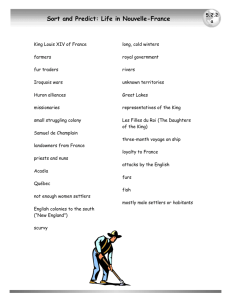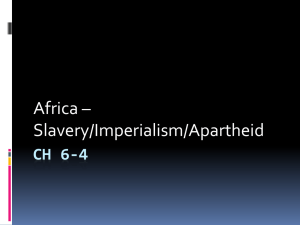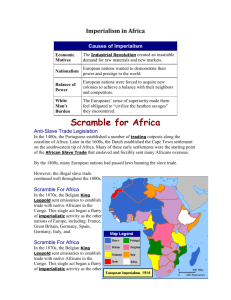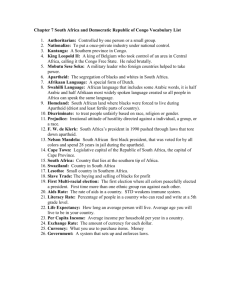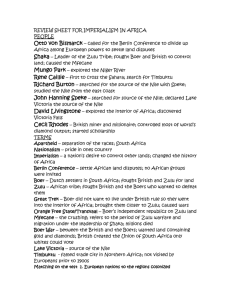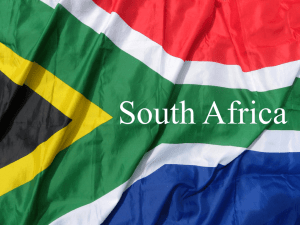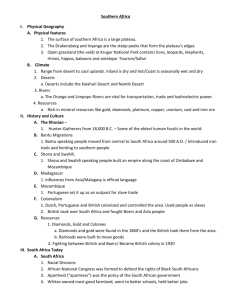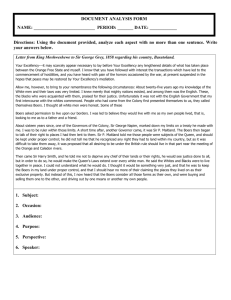5th and 6th periods
advertisement
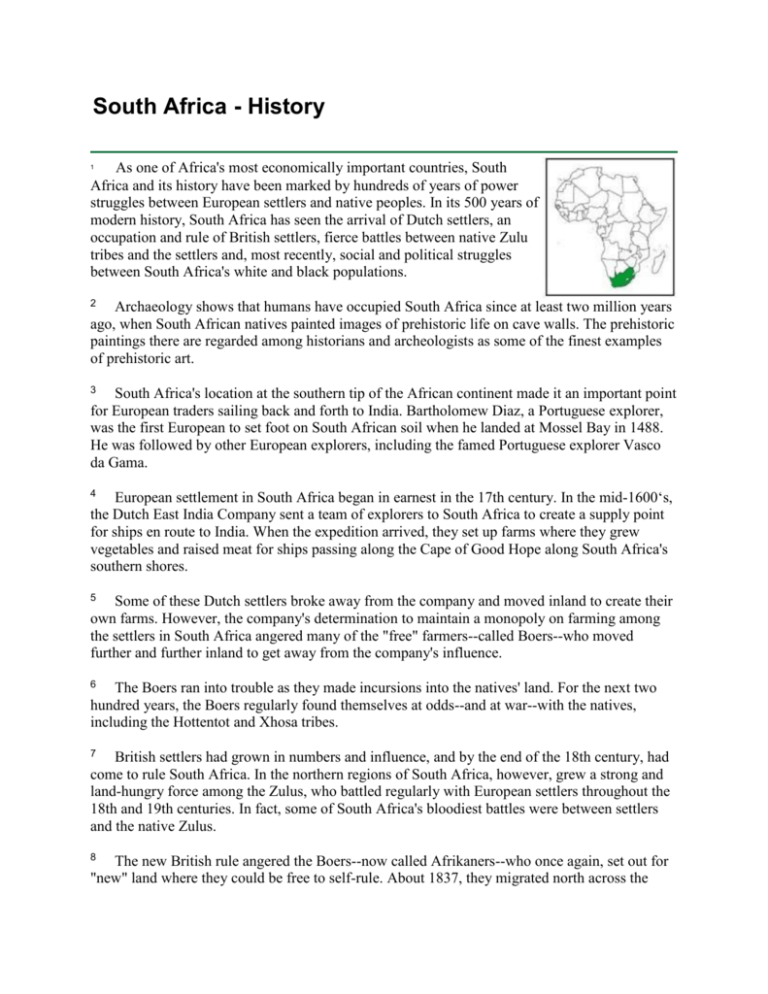
South Africa - History As one of Africa's most economically important countries, South Africa and its history have been marked by hundreds of years of power struggles between European settlers and native peoples. In its 500 years of modern history, South Africa has seen the arrival of Dutch settlers, an occupation and rule of British settlers, fierce battles between native Zulu tribes and the settlers and, most recently, social and political struggles between South Africa's white and black populations. 1 2 Archaeology shows that humans have occupied South Africa since at least two million years ago, when South African natives painted images of prehistoric life on cave walls. The prehistoric paintings there are regarded among historians and archeologists as some of the finest examples of prehistoric art. 3 South Africa's location at the southern tip of the African continent made it an important point for European traders sailing back and forth to India. Bartholomew Diaz, a Portuguese explorer, was the first European to set foot on South African soil when he landed at Mossel Bay in 1488. He was followed by other European explorers, including the famed Portuguese explorer Vasco da Gama. 4 European settlement in South Africa began in earnest in the 17th century. In the mid-1600‘s, the Dutch East India Company sent a team of explorers to South Africa to create a supply point for ships en route to India. When the expedition arrived, they set up farms where they grew vegetables and raised meat for ships passing along the Cape of Good Hope along South Africa's southern shores. 5 Some of these Dutch settlers broke away from the company and moved inland to create their own farms. However, the company's determination to maintain a monopoly on farming among the settlers in South Africa angered many of the "free" farmers--called Boers--who moved further and further inland to get away from the company's influence. 6 The Boers ran into trouble as they made incursions into the natives' land. For the next two hundred years, the Boers regularly found themselves at odds--and at war--with the natives, including the Hottentot and Xhosa tribes. 7 British settlers had grown in numbers and influence, and by the end of the 18th century, had come to rule South Africa. In the northern regions of South Africa, however, grew a strong and land-hungry force among the Zulus, who battled regularly with European settlers throughout the 18th and 19th centuries. In fact, some of South Africa's bloodiest battles were between settlers and the native Zulus. 8 The new British rule angered the Boers--now called Afrikaners--who once again, set out for "new" land where they could be free to self-rule. About 1837, they migrated north across the Orange River to northwest South Africa into land known as the Orange Free State and the Transvaal region. This migration of some 4,000 Afrikaners was called "The Great Trek" and earned the migrating Afrikaners the nickname Voortrekkers, which means literally "travelers on in front." The Trek scattered Boers all across the interior of the country and was an important event in modern South African history. 9 Some of the Boers encountered Zulu warriors who were determined to stem the influx of white settlers. The British ultimately defeated the Zulus at the end of the 19th century, but only after suffering massive losses and inflicting thousands of deaths on the Zulus. Meanwhile, the discovery of diamonds and gold in the newly settled Boer regions of interior South Africa served to worsen relations between the British rulers and the Boers. 10 In 1868, diamonds were discovered in Boer territory and 22 years later, gold. The discovery of diamonds and gold led to massive immigration into Boer regions and ultimately two wars between Britain and the Boers called the First and Second Boer wars. In the first war, the Boers defeated the British, but lost in the second. The Boer regions were joined with other British regions to form the Union of South Africa in 1910. 11 With this newfound unity of European settlers in South Africa, the government adopted a policy of segregation between white Europeans and black natives, despite the fact that whites were--and still are--a small minority of the South African population. This policy, called apartheid, was grossly unfair to South Africa's black population, many of whom found themselves living in dire poverty at the hands of apartheid. Throughout the 20th century, apartheid was roundly criticized and rejected by many in the world community. 12 A former Zulu chief named Albert John Luthuli, confined to his home for criticizing apartheid, was awarded the Nobel Peace Prize in 1960 for his opposition. One of the most famous and vocal opponents of apartheid was Nelson Mandela, the African National Congress leader who was sentenced to life imprisonment in 1961. 13 Thanks to the efforts of Luthuli, Mandela--who was released in 1990 and also awarded a Nobel Peace Prize--and others in South Africa and around the world, apartheid ended and South Africa has finally seen the rise of black leaders to high power within South African government. Name _____________________________ Date ___________________ 1. Humans have occupied South Africa for at 2. The first European to set foot on South least two million years. African soil was __________. False Hernando de Soto True Ponce de Leon Vasco da Gama Bartholomew Diaz 3. European farmers who settled inland were called __________. Zulus Boers Xhosa Hottentots 4. Apartheid was: A war between Boers and the British A way of farming for European settlers A policy of racial segregation A town in Transvaal province 5. African National Congress leader Nelson Mandela was jailed for his opposition to apartheid. False True 6. Zulus were ultimately successful in defeating the British. False True 7. The Voortrekkers were: A detachment of Zulu warriors Boer farmers who traveled into interior South Africa British soldiers A native tribe 8. The Boers won the Second Boer War against the British. False True

